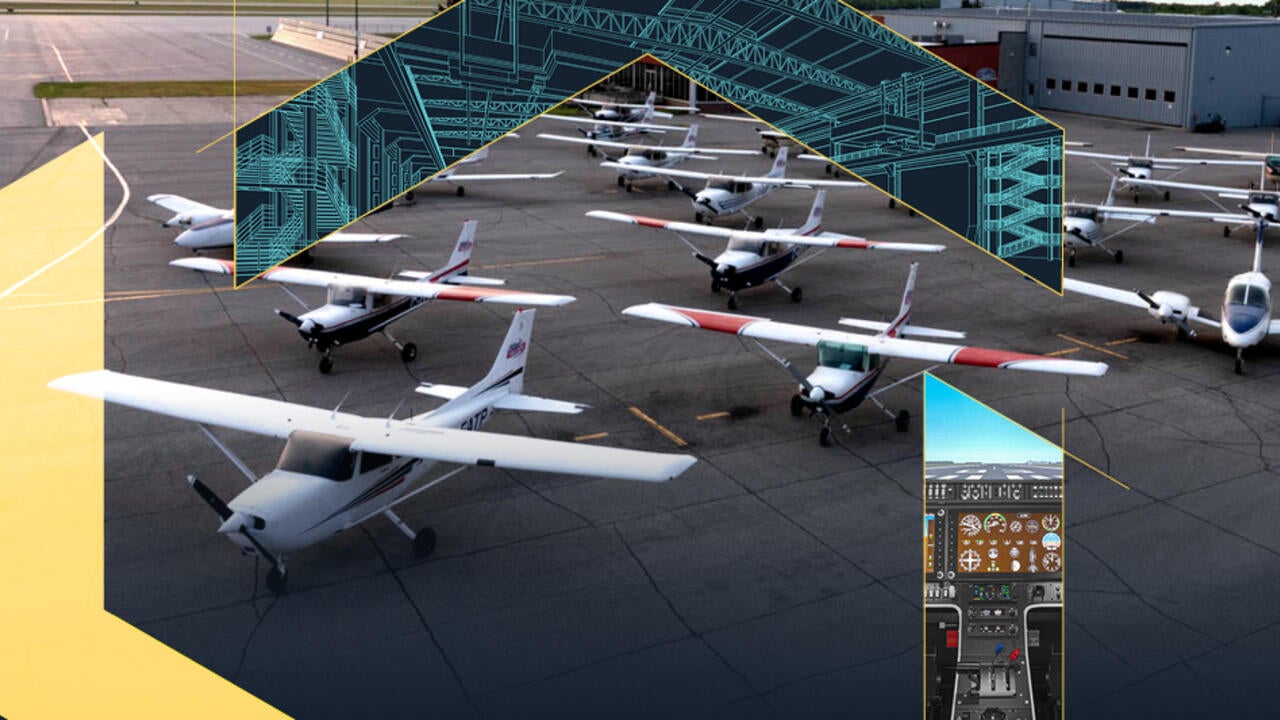
Waterloo launches sustainable flight school competition for students
The competition seeks net-zero energy and carbon-neutral performance designs for a sustainable flight school of the future.

The competition seeks net-zero energy and carbon-neutral performance designs for a sustainable flight school of the future.
By Sam Toman Media RelationsThe University of Waterloo is launching a student competition that seeks net-zero energy and carbon-neutral performance designs for a sustainable flight school of the future.
Waterloo Institute for Sustainable Aeronautics (WISA) is partnering with the Waterloo Wellington Flight Centre (WWFC), Alsim Flight Training Solutions, and the Region of Waterloo International Airport to host the competition.
The competition kicked off on January 17, 2022, with the winners set to receive $8,500 in total prize money.
“There has been an international shortage of pilots, with Boeing projecting 612,000 new pilots will be needed between 2021 and 2040,” said Suzanne Kearns, director of WISA. “Flight training is an expensive endeavour for students and contributes to carbon and noise emissions.”
“Using innovative technologies such as electric aircraft, flight simulators, and virtual reality, it is feasible to reduce training costs and environmental impacts while simultaneously improving learning effectiveness,” Kearns said.
Student teams will prepare designs for the flight school buildings as well as operational considerations to optimize economic, social, and environmental sustainability, which will be reviewed by a team of judges made up of industry experts.
“The competition promises to spark a holistic rethinking of the aviation training sector as hubs for green innovation,” said Bob Connors, general manager of WWFC. “We are seeking inspirational ideas, exciting designs, and new directions towards a more sustainable future for the air transport training sector.”
There will be opportunities for the student teams to engage with the panel of experts and ask questions about their designs. The judges will choose the top three designs on May 27, 2022, while the final student presentations and winners’ announcements will be at the WISA Annual General Meeting on June 24, 2022.
The student teams are to submit their projects through WISA.
About the Waterloo Institute for Sustainable Aeronautics
The Waterloo Institute for Sustainable Aeronautics (WISA) mission is to be the world’s leading hub for sustainable aeronautics research, technology, and education. Designed to be different, WISA mobilizes the interdisciplinary research capacity of all six faculties at the University of Waterloo to drive meaningful and lasting change within the aviation and aerospace industries. Find out more at uwaterloo.ca.
About the Waterloo Wellington Flight Centre
Founded in 1932 at Lexington field in North Waterloo, the Waterloo Wellington Flight Centre (WWFC) is deeply rooted in the Waterloo region. WWFC is proud to offer a state-of-the-art facility, partner with two prestigious post-secondary institutions, offer industry-recognized training to individuals seeking a career in aviation and still strongly support the general aviator. WWFC’s Vision is to be the most respected flight school in Canada, providing excellence in training, equipment and facilities creating the highest degree of customer satisfaction and success.

The average lifetime of a phone in Canada is 4.5 years, and we tend to replace these devices for reasons other than breakage. (Photo: GettyImages/Bet Noire)
Read more
The amount of e-waste that Canadians generate will double by the end of this decade, according to new research

(GettyImages/ Rosella De Berti)
Read more
Study reveals changes International Olympic and Paralympic Committees could implement to keep Games viable and safer for athletes

Read more
An ambitious research collaboration with Habitat for Humanity is reimagining home ownership across Waterloo Region and Canada
The University of Waterloo acknowledges that much of our work takes place on the traditional territory of the Neutral, Anishinaabeg, and Haudenosaunee peoples. Our main campus is situated on the Haldimand Tract, the land granted to the Six Nations that includes six miles on each side of the Grand River. Our active work toward reconciliation takes place across our campuses through research, learning, teaching, and community building, and is co-ordinated within the Office of Indigenous Relations.